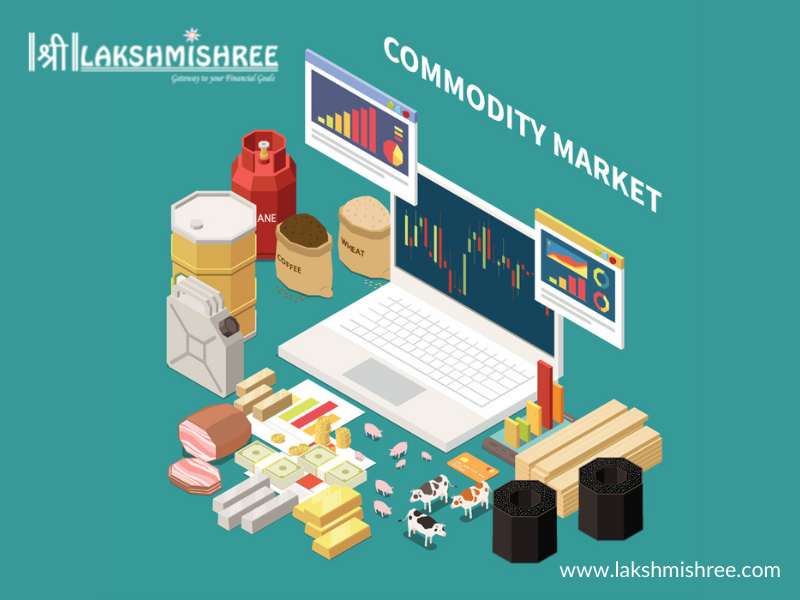
Commodities trading is the best-chosen alternative among traders as they enhance diversification to your asset portfolio. Moreover, it also considers being a lucrative opportunity to make strong financial gains as time flows. Commodity Trading is an age-old practice that has progressed over the ages. This article will help you understand what is commodity trading and how to trade them.
But there are several traders tagged as the beginner in the commodity market. However, with the 120 distinct commodities, many of them will have this question hitting their mind and wondering what is a commodity and which commodity is treated as the best commodity to trade in India. Subsequently, the blog aims to be a problem solver for all your questions.
A commodity is a cluster of goods or assets that we use in our day-to-day lives. Therefore, by nature, commodities are tradable and exchangeable like food, metal, and energy. They are natural resources that can be used up by individuals and companies.
Commodities offer massive support for farsighted investors to become a distinct asset class. Furthermore, there are numerous investors who have a belief that the commodities market is much riskier and complicated than equity. Though every person stands with their own individual opinion.
If we look into the fundamentals of commodities, then the understanding part becomes easy. Consequently, all we need to do is to understand the ratio between supply and demand. Before making gigantic investments, it is advisable for every investor, to gain extensive knowledge about the commodities market.
Commodities are classified into four major sectors. They are as follows:
Iron, Aluminum, Copper, Nickel are the commodities that are mainly used for construction and manufacturing purposes. On the contrary, gold, silver, and platinum are considered valuable, since they are utilized for investment and jewelry-making purposes.
Crude oil and natural gas play a vital role in fueling the globe and are chiefly used for transportation.
Commodities like cocoa, sugar, wheat, soybean, hogs, cotton, and cattle are agricultural commodities that add to other industries.
Commodities are classified into two different commodities - hard and soft commodities. Hard commodities are the natural resources that mines out of the ground. Moreover, it includes copper, gold, and oil. Whereas soft commodities include livestock, cotton, sugar, etc.
In India, Commodity trading has taken years to start with as compared with other different countries. There are several significant reasons which impacted commodity trading for beginners. They are as follows:
Modernization and digitalization have changed everything. As a result, Commodity trading is becoming popular nowadays. Moreover, Traders and investors are shifting from the stock market towards the commodity market.
Traders may invest in commodities through six chief trading exchanges. Below is the checklist:
Basically, commodities are traded either in the derivatives market or spot market. Therefore, there are two types of commodity markets through which trading takes place.
The spot market is referred to as a cash market or physical market where both buyers and sellers interchange commodities in physical for instant delivery.
The derivative market constitutes futures, forwards, and options. However, if you are searching out for the easiest trading trick in the commodities market, then you can book your trade via a futures contract. Futures contracts are the deals wherein a commodity is bought or sold at a predefined price for a future date. Futures Contracts act as a prevention tool for traders and reduce the risk of price fluctuation in the future.
To trade in commodities, it is mandatory to select a broker. There are numerous brokers who provide both equity and commodity trading futures services. All you need to do is search for Lakshmishree Investment & Securities Pvt Ltd and open your Trading Account to be a part of the Commodities Market or the Indian Stock Market.
I hope, this article justifies what is commodity trading in India. Let’s begin with another question which is “why trade commodities or the reason behind trading commodities.”
There are traders or investors who are willing to expand their portfolio, wherein commodity can be the ideal option. Below are some aspects which tend to be a considerable alternative for commodity trading for beginners.
The commodity market is highly volatile in nature which offers amply trading opportunities to traders.
With just making small deposits, you can easily buy a trade and enlarge your gains. But do not forget the negative side, the particular trade may amplify your losses.
Commodity trading time is the most considerable option for beginners to trade. The trading time for the commodity market in India:
For Summers: 9:00 am to 11:30 pm (Monday to Friday)
For Winters: 9:00 am to 11:55 pm. (Monday to Friday)
Therefore, open for a maximum period of time in a day which makes it convenient for traders to trade and gain.
The commodity market diversifies the risk of your portfolio which associates with an equity investment. Hence, traders can mitigate the losses thereby creating a balanced portfolio of both equity and commodity investment.
Crude Oil considers being the best commodity to trade in India. However, the reason behind this is that we can see larger volumes, more volatility, and less margin as compared to other commodities.
Forward market Commission(FMC) is the regulatory body that controls the provisions of commodity trading in India. In the year 2015, FMC merges with the Securities and Exchange Board of India.
A commodity trader may visit the website of commodity exchange like mcx.india.com and easily download the margin file.
For beginners, you can look out for the contracts for difference that let your commodity trading easier. It is a contract that considers being the forthright option for trading in commodities.
Commodity trading is a bit safer option because it expands your portfolio and also acts as a verge against inflation.
